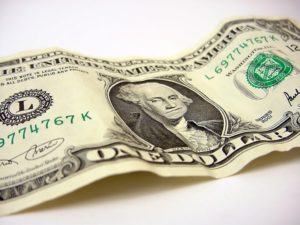 The U.S. Dollar and the Canadian Dollar were two out of only three currencies that kept pace with inflation in Israel during 1981, according to economic reports summing up the year just ended. The third was the Swiss Franc. All other foreign currencies failed to keep pace with inflation, which was around 103 percent. The final precise figure will only be issued officially on January 15.
The U.S. Dollar and the Canadian Dollar were two out of only three currencies that kept pace with inflation in Israel during 1981, according to economic reports summing up the year just ended. The third was the Swiss Franc. All other foreign currencies failed to keep pace with inflation, which was around 103 percent. The final precise figure will only be issued officially on January 15.
The U.S. Dollar rose in value, in nominal terms, against the Israeli Shekel by 106 percent during 1981, these reports show. The figure for the Canadian Dollar was 107 percent and for the Swiss Franc 104 percent. The British Sterling fared one of the worst, showing a 65 percent increase against the Shekel — which is a serious fall in real terms. Agreement Reached On Wage Hikes
Meanwhile, the Histadrut and the National Employers Association agreed last Friday on a five percent wage raise payable from January salaries. This is the fourth such rise over the two-year period April 1980 through March 1982 and is intended to compensate for “erosion” of salaries that occurs despite the periodic cost-of-living adjustments.
One such periodic C.O.L. adjustment is also due as of January salaries, so that wages will in fact rise from February I by some 23 percent. (The C.O.L. hike for the last quarter of 1981 was around 18 percent.)
The government has already indicated that it will comply with this agreement in respect to civil servants. Indeed, there are indications that the treasury will agree to pay slightly more to the lowest grades in the civil service.
In April 1982 new wage contracts are to come into force in most of the economic sectors. Unions and employers are already preparing themselves for the tough and protracted bargaining that this biennial event always entails. Investment In Shares Was Profitable
The end-of-year reports showed that investment in shares — almost a national pastime in Israel — was a profitable activity on the average during the year just ended. Share prices on the Tel Aviv Stock Exchange rose by more than 20 percent in real terms (i.e., after taking account of inflation).
Since Stock Exchange profits are nontaxable under Israeli law, this statistic readily explains why so many ordinary Israelis spend so long pouring over the financial pages and closeted with investment advisers in their High Street bank branches.